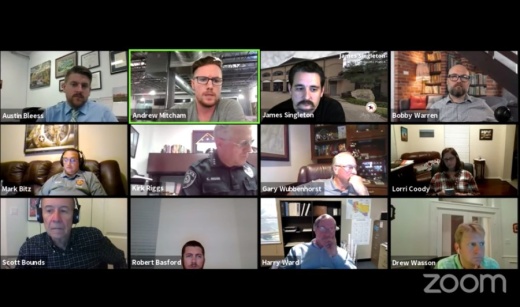The discussion, which did not involve any action by the city to create the TIRZ, took place at a Sept. 21 virtual meeting of Jersey Village City Council.
A TIRZ is a type of special district created to attract developers and investment to an area. If created, it would allow the city to take tax revenue generated within the TIRZ and place it into a separate fund that can then go to various uses within the TIRZ boundaries. The city previously created a TIRZ in 2017 to promote investment in a 274-acre area south of Hwy. 290.
The new potential TIRZ would help the city specifically with "teardown-rebuild" efforts, a type of flood mitigation strategy that involves tearing down homes at the individual level and building new homes in their place that are better suited to withstand flooding. The TIRZ would encompass roughly 32 homes on Jersey Drive in the city, according to council documents.
City Manager Austin Bleess said there is not a strong financial incentive for builders at this point in time to tear down and rebuild the Jersey Drive properties. With a TIRZ in place, the city would be able to purchase and raze the homes and would have flexibility on offering incentives or discounts to builders to build new structures on the property. The city would also have more control and could choose to sell to builders strictly for single-family projects, he said.
As a result, some council members acknowledged that the TIRZ could end up costing the city money in the short-term.
"These districts have been used in a lot of different ways," said Council Member James Singleton, who expressed support for the concept. "This is the only time I’ve seen where the city is intending to lose money on buying a property, demolishing it and selling it to a private party."
The potential TIRZ has come under consideration as the city is also looking to move forward with grant-funded home elevations in other parts of the city. Home elevations could still be an option for the homes on Jersey Drive in the future, Bleess said, but the TIRZ would provide the city with another option to address flood-prone homes in the meantime.
"To elevate all those homes on Jersey [Drive], the city would be looking to put in about $880,000, ... even with FEMA grants," Bleess said. "That’s where we came up with idea of teardown-rebuilds. That $880,000 is better spent on other means that might be done quicker."
One element of the plan that is still to be determined is related to whether the TIRZ is strictly limited to the residential properties or if it includes nearby commercial properties as well.
Limiting the TIRZ to residential properties can only be done if homeowners representing 50% of the appraised value within the boundaries petition to be in the TIRZ, Bleess said. A broader area would allow the TIRZ to raise more money off property value increases and would give the city a wider area in which the money could be spent.
Several residents within the targeted area spoke out against the TIRZ at the Sept. 21 meeting, and council members attempted to address some of their concerns.
Resident Michael Stembridge said he did not want to see Jersey Village start to operate like the city of Houston, which he claimed was "addicted" to forming TIRZs. He said he was afraid a TIRZ would result in the construction of many large, expensive houses and would not benefit the residents who live there now.
Singleton said he agreed that Houston had abused the TIRZ system but that he felt the proposal in Jersey Village was warranted and had a very specific purpose.
Resident Mike Lesser said he opposed the TIRZ because he felt the free market should determine what is built on Jersey Drive without the city getting involved.
Council Member Bobby Warren said he normally supported letting the free market work but that it could not be relied on in this instance.
"The free market has not solved the problem," he said. "While the free market takes its time, people are sitting in homes right now worrying about the rain outside."
If the TIRZ is created, Singleton said people who live within its boundaries and do not plan on moving would make ideal candidates for its board of directors, which would also give residents the power to approve the builders with which the city contracts.
Following the discussion, council members took no action. Details on the what exact area the TIRZ would cover and how long it would be in place still need to be hashed out, with council members directing city staff to look into setting up a town hall meeting and inviting residents from the 32 properties in question.





